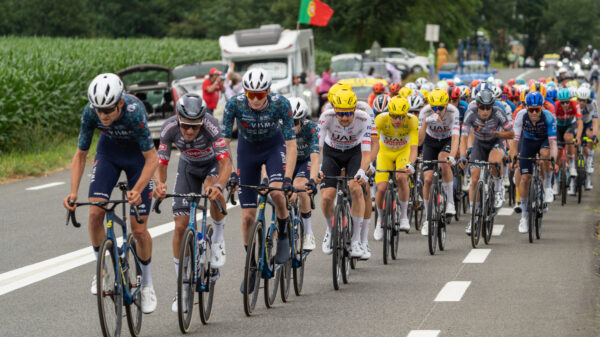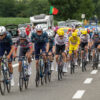Comment writer Chloe Ferreux continues her first person account of the presidential election in France as part of the ‘King’s Votes’ series.
After a surprising first round, in which Jean-Luc Mélenchon’s left-wing became the third political force in the country against all odds, the final round on Sunday April 24 ended a campaign without enthusiasm. The French have been left believing that it took place for “nothing”. However, between abstention and the rise of the extreme right, it is hard to deny that the political landscape of the country has taken a clear turn.
On the morning of Sunday April 24, France was under tension. The results for the overseas regions were released, where Marine Le Pen surprisingly won 60%. And in a typical house in the Haut-Doubs region of eastern France, this information did not fall on deaf ears. Indeed, for the two generations gathered under the same roof, following the elections is a challenge.
On the one hand Marc and Sophie, a young couple in their forties, are worried that Macron will fail “in the name of democratic principles.” On the other hand, their neighbours Josianne and Jaques, in their sixties, hope to return to the France of their childhood, with their ballots for Le Pen. The tension is at its peak, but as the first round it will be necessary to be patient since the result of this presidential election will only be known at 8pm.
The collapse of the Anti-Le Pen bloc
On the other side of France, Antoine, student and activist of the left-wing France Insoumise, spent the most “terrible” time of his life between the two rounds. And for good reason. In the last two weeks, he has become the target of a fierce battle between Marine Le Pen and Emmanuel Macron. Indeed, constituting the new third political force of the country, voters of France Insoumise are now the object of all covetousness.
But caught between “Putin’s pawn” and the “president of the rich”, it is midday when Antoine announces that he will abstain from voting. The act is brief, but this decision is the result of an important internal conflict between democratic duty and republican rage. To the great displeasure of the president-candidate, the anger of the left-wing electorate has greatly affected the Anti-Le Pen bloc. Thus, only one third of the voters who had chosen Jean-Luc Mélenchon in the first round intended to turn to Emmanuel Macron for the second round.
An election without triumph
Marc does not understand Antoine’s behaviour. A loyal right-wing voter, the Republican collapse persuaded him that the future lay with En Marche, Emmanuel Macron’s party. His wife Sophie has always voted left – but convinced by “democratic principles”, she voted for Emmanuel Macron on Sunday 24.
At 7.57pm, a rather comic scene is played out as the left-leaning middle-aged couple, and the right-wing older voters Jaques and Josiane, find themselves just as stressed in front of the massive TV in the living room. They listen vaguely to the journalists’ comments, their heads still replaying the results from overseas, which came in the morning.
8pm. The programme cuts to show the result. Emmanuel Macron is re-elected with 58.54% of the vote, a great relief for Sophie and Marc. And although they try to hide their joy to avoid offending the two pensioners next to them, they don’t manage to repress their smiles.
“We expected it,” sighs Josianne, almost immediately returning to the kitchen to finish cooking. “I told you this campaign was useless,” her husband Jaques replies, annoyed. Surprisingly, the evening quickly returns to normal. The guests join each other at the table and if the TV was not showing images of the candidates’ speeches in the background, an outsider would never have guessed that the future of the next five years of French politics had just been decided.
At least, until Sophie mentions the concerns of most French people that evening. “Between the insoumis and the extreme right, I don’t see how he’s going to govern,” she confides. The table quickly nods in agreement. Indeed, while those close to the president proudly dance in front of the Eiffel Tower or salute the achievement of their candidates, his score remains lower than in 2017 when he obtained 66.1% of the vote.
Conversely, although Jaque and Josiane turned away from the television too quickly to notice, Marine Le Pen passed the 40% mark for the first time. A failure for Macron, who had promised on May 7 2017 that the French would have “no longer any reason to vote for the extremes.”
The “resounding victory” of far-right ideas
Thus, Marine Le Pen may have lost that evening, but the ideas of the extreme right can congratulate themselves on a great victory. Increasing by seven points between 2017 and 2022, progressing into the final round in two consecutive election cycles, she congratulated herself on Sunday for carrying out battles that “reached new heights.”
The presidential election marks a growing normalisation of the far right. And if France took to the streets twenty years ago to protest against the arrival of Jean Marie Le Pen in the second round, nowadays it would be the same as protesting against almost a third of the French electorate. Le Pen has managed to stop herself being treated as a separate political force, creating a ‘soft’ anti-system presentation.
In fact, the themes of Le Pen’s Rassemblement National (RN) have punctuated the French public debate over the last few months, to the point where the French right has itself been incarnated in questions of national identity or immigration. This has greatly upset the French political spectrum.
Abstention: the third vote of these elections
However, in front of the TV, it was not only voters like Marc, Sophie, Josianne and Jaques who were represented. Hiding in the shadows, Antoine again chose a side that scored. In total 28.01% of the voters, 13 million people, did not turn out on April 24. In addition, three million people voted blank or invalid. Abstention is therefore the third big winner of these elections. In the end, Emmanuel Macron was re-elected with only 38.52% of registered voters.














